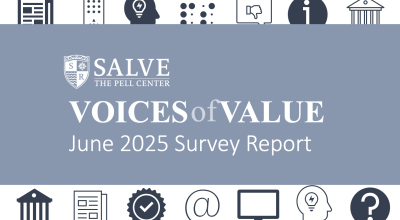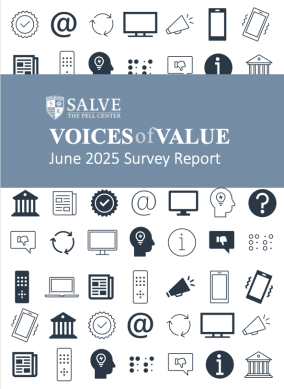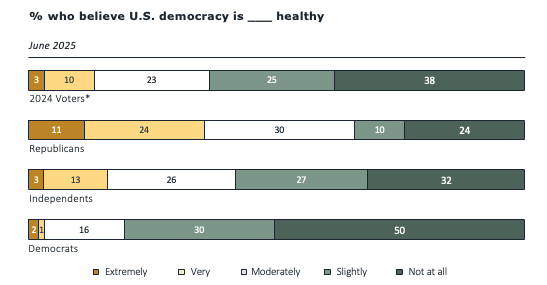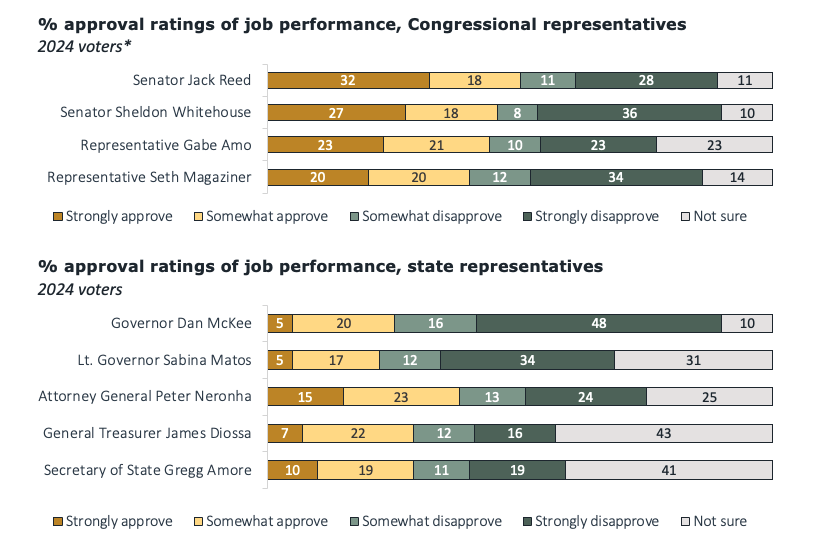
New Survey Results: RI Democrats and Republicans are living in different realities
New Pell Center poll shows little overlap between Republicans and Democrats on the health of U.S. democracy, the economy, and immigration policy.


NEWPORT, R.I. – Well over half of registered voters in Rhode Island believe the United States democracy is not healthy, though the level of concern varies by political party, according to a new survey from Salve Regina University’s Pell Center. The survey was directed by Pell Center Associate Director and Fellow Katie Sonder and fielded by Embold Research between June 16-22, 2025. It gathered responses from 804 registered voters in Rhode Island, with a modeled margin of error of 3.6 percent. Survey respondents are those registered to vote in Rhode Island who voted in the 2024 presidential election. The survey results show large divides between the major political parties, highlighting two very different lived realties between Democrats and Republicans.
Over half of registered Democrats agree that the United States is operating as a democracy, but 80% say it is not healthy and 94% believe we are facing a constitutional crisis. Democrats perceive a decline in the strength of the checks and balance system, which likely bolsters their sense of democratic backsliding. Only one-third (32%) agree the system is strong while 64% agree that country has fallen into dictatorship.
Republicans, on the other hand, are seven times more likely to agree that our democracy is healthy than they were in the June 2024 Voices of Value survey. Well over three-quarters of Republicans (83%) say policies from the Trump administration have helped them personally and the percent who agree that polarization has increased dropped by 15 percentage points between June 2024 (86%) and June 2025 (71%).

While all respondents tapped disinformation and fake news as a leading contributor to political polarization, just as they did in the June 2024 survey, the percent who believe political leaders add to the schism has increased. One year ago, only 13% of Democrats chose political leaders as a main cause, but in June 2025, 29% did, a 16 percentage point increase. The percent from the party who chose Republican officials as a main contributor dropped by 2%, however. Republicans are more likely to believe Democratic officials are a main cause of polarization over any other factor (58%).
On the economy—a hot button election issue—three-quarters of Republicans (76%) believe it is thriving, while nearly just as many Democrats (73%) believe we are in a recession. Only 17% of respondents chose the economy as one of the top three most important issues facing the country, however. Over half of Republicans tapped immigration (58%) as a top issue while Democrats chose Trump and the Republicans (66%) and the state of democracy (36%) as main concerns.
Independents—or those who are not registered with the Republican or Democratic party—often split the difference between their party counterparts. Nearly two-thirds (59%) say our democracy is not healthy, for example. The group was also more evenly divided than Republicans and Democrats on important issues facing the country: about one-third chose Trump and the Republicans (28%), inflation and the cost of living (34%), immigration (34%), and polarization and division (28%).
Given their concern on the issue of immigration and their party support for Trump, 91% of Republicans support the administration’s decision to deploy U.S. military troops in response to protests over the federal government’s approach to immigration enforcement. Almost all of Republicans (93%) want the federal government to increase spending on the border and immigration enforcement.
Regardless of major disagreements on issues like immigration and the economy, members of all parties largely want the federal government to increase spending on Medicare and Social Security. Enhanced funding for Social Security is overwhelmingly popular: 82% of Democrats, 75% of Republicans, and 70% of Independents agree.
Job performance approval ratings for three of Rhode Island’s four Congressional representatives dipped between June 2024 and June 2025. Representative Gabe Amo saw a 2 percentage point increase in net approval (+11), though Senator Reed holds the highest net approval rating (+12). Governor Dan McKee’s approval rating dropped from 36% in June 2024 to 25% in June 2025. Data for Congressional Representatives Amo and Magaziner is specific to their congressional district. Congressional District 1 has a modeled margin of error of 3.8% and Congressional District 2 has a margin of error of 3.3%, both at a 95% confidence level.

“The survey results suggest deep divisions between the Democratic and Republican party – not only on top issues but on major questions around the health of our democracy,” said Katie Sonder. “In a way, it’s not surprising to see Republicans now have a healthier outlook because, historically in national data, positive outlooks swell when the executive branch is controlled by the supported party. But the degree to which the parties disagree, including on whether the economy is thriving or in a recession, is alarming. It’s as if we are living in parallel realities. I will be interested to see how the Independent party continues to shape Rhode Island politics since the group represents the majority of registered voters and holds varying political opinions, some of which lean left and some of which lean right.”
This survey was conducted as a part of the Pell Center’s Voices of Value project that works to unpack the nuances of political polarization, understand media consumption habits, and track support for various political actors. The June 2025 survey is the fourth installment of the project.
